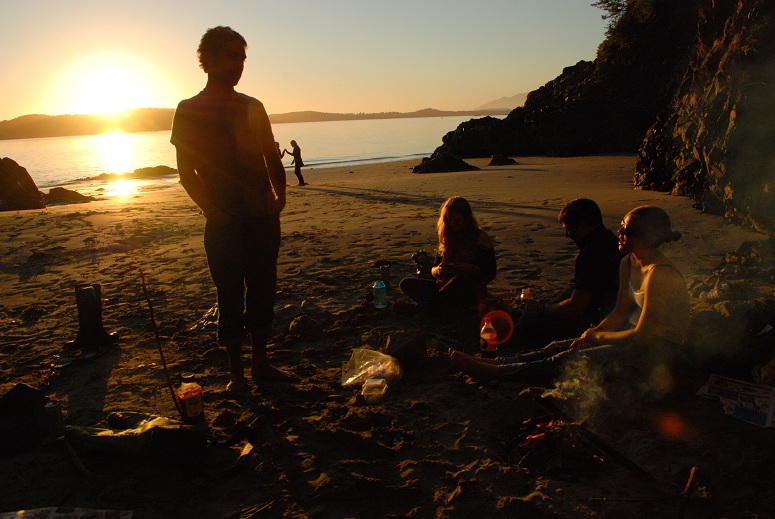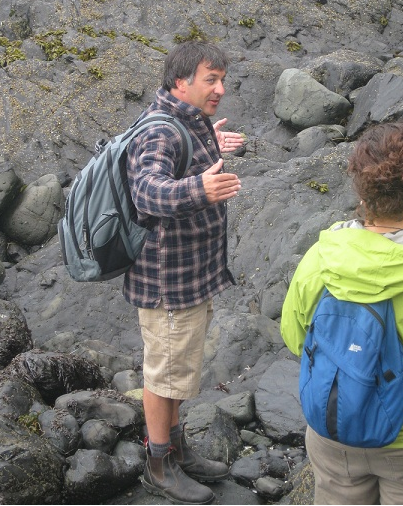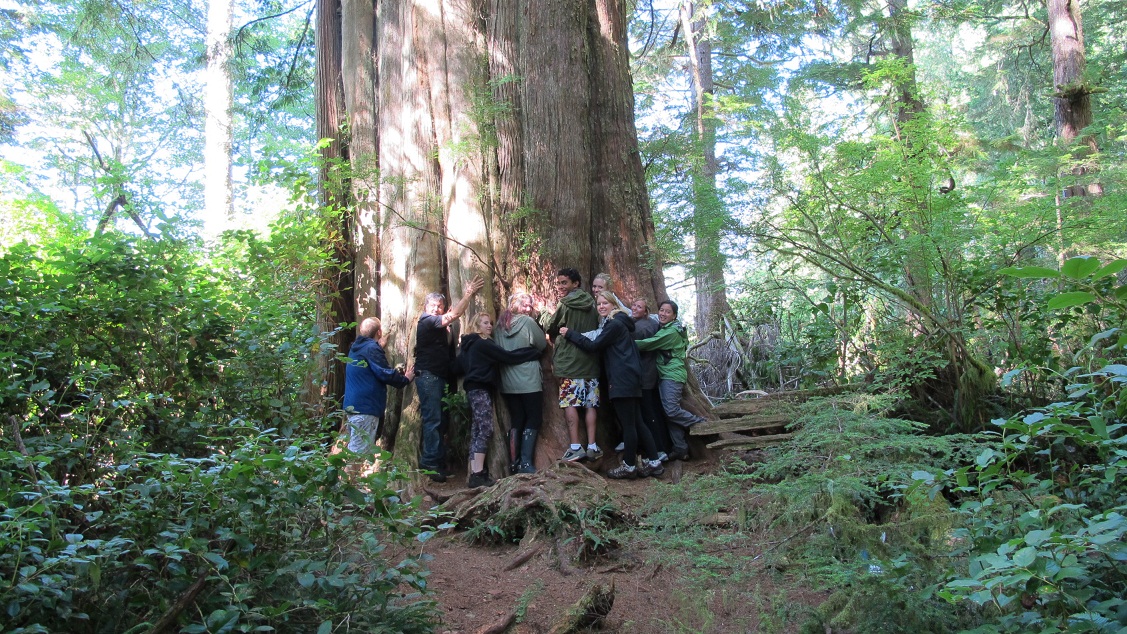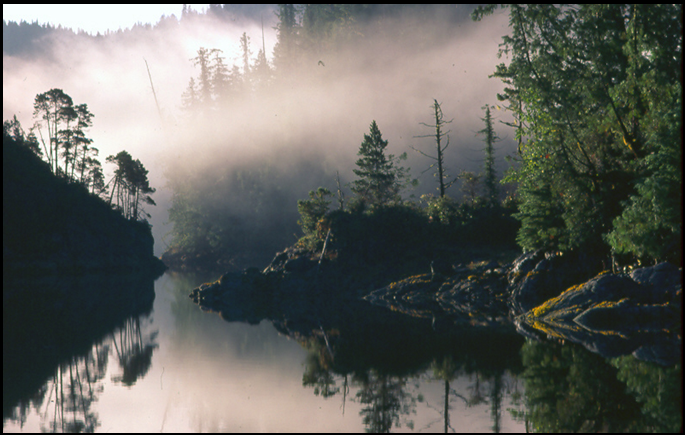|
Students interested
in taking the Philosophy Field Course should email
Stefan Linquist with a brief statement of interest
describing your level of education, academic
interests, and explaining why you want to
participate. Students from any discipline are
welcome to apply, a background in philosophy is
not necessary.
Please send your statement of interest by February 10th, 2019. You will be notified the following week. A maximum of twelve students are able to participate. Stefan can be contacted at: linquist@uoguelph.ca |
PHIL 4160
PHILOSOPHY
FIELD
COURSE
Tofino,
British Columbia
2019
May 20-30
This course will spend 10 days on location at the Clayoquot Sound Biosphere Reserve and the Hooksum Outdoor School, on the west coast of Vancouver Island. This is a site of astounding natural beauty as well as economic and political significance. In 1993 the area staged Canada's largest act of civil disobedience - a protest over logging in one of North America's only remaining old-growth rain forests. Following this episode the region has become a microcosm for the competing economic, environmental and political interests that our society must balance on a global scale.
We will learn about the ecology and social history of this region, to understand why and how various stakeholders value it. We will interact with environmentalists, First Nations groups, and industry members to determine how they view environmental issues. For example, what does "sustainability" mean to these groups? What are their respective long term goals and can they be reconciled?
Students will formulate a general research question prior to arriving in Clayoquot Sound. The experiences that they collect during the visit will be included in a research paper and a presentation that will be prepared over the course of the Summer 2019 semester.
back to top of page

Supply a $400 deposit to Pam Armitage in the Philosophy department before April 5th
(pam.armitage@uoguelph.ca).
There will be three meetings in April and May, to prepare for our departure. Meetings will be held in Guelph at a time convenient for all participants. The aim of these visits is to plan our visit and to develop individual research questions.
Students make their own way to Tofino, arriving on or by May 20th. You can fly either to Vancouver Airport or to Victoria Airport. From the Vancouver airport you must get yourself to the Vancouver bus terminal (at 1150 Station Street). From there you take the Tofino Bus via Horseshoe Bay to Tofino. Similarly, from the Victoria Airport you must catch the Tofino Bus from the Victoria Bus Terminal (at 721 Douglas Street).
Note that as of May 16th, Tofino Bus leaves Vancouver at 7:30 am and 2:15 pm. It leaves Victoria at 8:15 am and 2:55 pm. Please book your flight accordingly. For example a morning bus departure on May 20th would probably require an overnight stay in Vancouver or Victoria on May 19th. It is also recommended that you book your bus ticket in advance.
It is also possible to fly directly from Vancouver airport to Tofino with Pacific Coastal Airlines.
May 20th, arrive at the Whalers on the Point Guesthouse, in Tofino.
May 20 -22, meet with stakeholders in Tofino (see below).
May 22nd, Travel by water taxi to Hooksum Outdoor School, traditional Hesquiaht Territory.
Students
May 25th, return to Whalers on the Point in Tofino.
May 25-30, continue meeting with local stakeholders, including a trip to Wild Pacific Trail and Ucluelet Aquarium.
Students will meet in Guelph on approximately four occasions in June & July, to receive guidance on research reports.
back to top of page
Prior to departure, students submit a research proposal(15%) outlining a question of relevance to the region and a plan for investigating it.
During the excursion, students keep a journal documenting ideas and observations pertaining to their individual research projects (25%).
Students receive a participation mark based on their stakeholder interactions in the field (20%)
Upon returning, students complete their final research paper (40%) due at the end of the summer 2019 semester. We meet on approximately four occasions in June and July to discuss your progress.

Students must register for the Philosophy Field Course (PHIL*4160) during the Summer semester.
Students are responsible for booking their own flights to Vancouver or Victoria, and for their bus to and from Tofino.
There is an activity fee of $400 per student, payable by April 5th.
The cost of accommodation at Whalers Guest House, the fees associated with stakeholder meetings, the travel to Hooksum Outdoor School, and meals at Hooksum are covered by your tuition and activity fee. These expenses are being subsidized by the College of Arts and the Department of Philosophy.
While staying at Whalers, students are able to purchase groceries in town and cook their own meals in the communal kitchen.
Approximate budget
Activity fee $400
Flight from Guelph to Victoria: $650
One night accommodation at hostel in Victoria: $60
Tofino Bus (return from Victoria): $125
Food: $200
Total: $1,435
back to top of page

I have been visiting Clayoquot Sound annually since 1999, when I spent a research summer studying den choice in the Giant Pacific Octopus. In recent years I have served as a founding board member for the Ucluelet Aquarium Society. In these roles I have come to appreciate the unique ecology of this region. I have also taken opportunities to interact with loggers and fishermen, with environmentalists and naturalists, with educators, artists, scientists, business people and politicians who live and work in this area. It has been an education for me to speak with these local stakeholders and learn about their perspectives on environmental and economic issues.
When I teach courses in environmental philosophy each year, many of the readings and classroom discussions strike me as out of synch with the issues as I encounter them in the Clayoquot region. I designed this course in an effort to bring these worlds together. I hope that students will benefit from interacting with people for whom environmental issues are a living concern. I would also like for students to learn about the ecology of this region and determine for themselves why it is valuable. At the same time, for people living in this region there is an opportunity to benefit from discussing philosophical issues with interested visitors.
-Stefan Linquist
To find out more please contact me: linquist@uoguelph.ca
or visit my website biophilosophy.ca

Nuh-chah-nuth society: What is its social/environmental philosophy and how is this expressed politically?
Goetze,
T.C. (2005). Empowered
Co-Management:
Towards
Power-Sharing and Indigenous Rights in
Clayoquot Sound, BC. Anthropologica, 47: 247-265.
*R.E.Atleo,
(2002) Commentary. Discourses
in
and about Clayoquot Sound: A
First Nations perspective. Magnussen
&
Shaw (2002) A Political Space: Reading the Global
through Clayoquot Sound. McGil-Quuens U. Press.
Harkin, M. (1998). Whales, Chiefs, and Giants: An Exploration into Nuu-Chah-Nulth Political Thought. Ethnology, 37317-332.
Wallner, A. (1998). The Aboriginal people’s position in land use conflicts in British Columbia. Societe Suisse des Americansites, 62: 61-66.
Hoberg, G. & E.
Morowski (1997). Policy change through sector
intersect ion: forest
and
aboriginal
policy in Clayoquot Sound. Canadian Public Admin. 40: 387-414.
Calyoquot Sound
Scientific Panel (1995) First Nations'
Perspectives: Relating to Forest Practices Standards.
Postnikoff, H
(unpublished), Coming
full
circle: Applying a Nuu-Chah-nulth World View in
Community Based Research.
Environmentalism in Clayoquot Sound: What is its aim and can it succeed?
*W.Magnussen (2002), Introduction: The puzzle of the political. Magnussen & Shaw (2002) A Political Space: Reading the Global through Clayoquot Sound. McGil-Quuens U. Press.*K. Shaw (2002), Encountering Clayoquot, reading the political. Magnussen & Shaw (2002) A Political Space: Reading the Global through Clayoquot Sound. McGil-Quuens U. Press.
*W. Chaloupka (2002), There must be some way out of here: strategy, ethics and environmental politics. Magnussen & Shaw (2002) A Political Space: Reading the Global through Clayoquot Sound. McGil-Quuens U. Press
*R. M'Gonigle, "Somewhere between center and territory. Magnussen & Shaw (2002) A Political Space: Reading the Global through Clayoquot Sound. McGil-Quuens U. Press.
Willems-Braun, B. (1998). Buried Epistemologies: The politics of nature in (post)colonial British Columbia. Annals Ass. Of American Geographers, 87: 3-31.
Lavallee,
L. & P. Suedfeld
(1997). Conflict
in
Clayoquot
Sound...Psychological Aspects of Environmental
Controversy. Canadian Journal of
Behavioural Science, 1997,29:3,194-209.
J. Goad
(unpublished), Land
Use
Practices in Clayoquot Sound: An assessment of Success
of the 1993 Protests.
Sustainability in Clayoquot Sound: What does it mean and how can it be achieved?
Butt, G. &. McMillan (2009). Clayoquot Sound: Lessons in ecosystem-based management implementation from an industry perspective. BC Journal of Ecosystems and Management, 10:13–21.
Owen et al. (2009). Capturing Old-Growth Values for Use in Forest Decision-Making. Environmental Management, 43:237–248.
Parai,
B. & Esakin, T. (****)
Beyond
conflict
in Clayoquot Sound:
the future of sustainable forestry
Lertzman, D. & Vredengurg, H. (2005). Indigenous Peoples, Resource Extraction and Sustainable Development: An Ethical Approach. J. of Business Ethics 56: 239–254, 2005.
Rachel
Dodds (unpublished) Is
Change
a Constant? An Assessment of Stakeholders
Participation in Sustainable Tourism Practices in
Tofino, BC.
Scientific authority and non-scientific knowledge: Are they in conflict and, if so, can they be reconciled?
*G.C.Shaw, "Clearcut identities: Tracking shape shifters in Clayoquot Sound. Magnussen & Shaw (2002) A Political Space: Reading the Global through Clayoquot Sound. McGil-Quuens U. Press
Turner et al. (2000). Traditional Ecological Knowledge

back to top of page

"This was the best course I have ever taken in my four years at university here. It was the
first course that really showed me what my program, Environmental Governance and
Philosophy means in the real world. I would take this course again and again if I could
and hope many other students have the opportunity to take part on it." -2012 student
"I just wanted to note that this course was by far the most integral I have taken in my
entire university career. That being said, this course allowed me to see how philosophy
functions and effects real life situations, something in academic settings we are not
predisposed to. This experience has greatly affected my outlook on things, and helped me
understand how things work as opposed to just readings few lines about them in a
textbook." -2012 student
"I have already recommended this course to several peers who I think would be interested
in the subject matter. This was one of the more formative courses in my university
experience. I think it's really important because it provided the student with a taste of
what it would actually be like to create an individual research project and conduct the
research. Because of its interdisciplinary nature (involving students from many different
backgrounds, and speaking with people from different background in the research
process) I feel I experience different insights than I would had the class not involved
people from different disciplines. I think that this was the most interesting and
enlightening feature of the course. Overall it was wonderful and I wish there were many
many more courses like it." -2012 student.
"This was definitely the most engaging course I have taken. Field courses work surprisingly well for philosophy - we had the opportunity to engage with very relevant and meaningful contemporary problems in environmentalism and sustainability. I believe this kind of course develops practical skills that are integral tro philosophy education, such as critical thinking anbout complex and concrete problems or evaluating the arguments and perspectives of different interest groups." - 2011 student
"This field course provided a chance to applky everything that I've been studying over the past four years at university. This is the first course I have taken where I felt that my studies meant something in the sense that work was largely influenced by experience and not just a summary of others' opinions. The field course component was incredible. I felt that I learned far more than I had hoped to prior to arriving in Tofino...." 2011 student.
